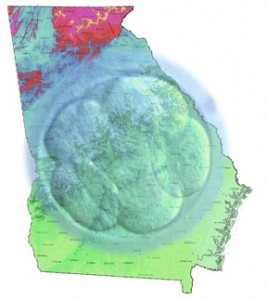Georgia Law: The First Salvo Towards Embryo Personhood
A Guest Post by: Harold Eskin, Esq.
New laws are beginning to appear on the books of many states that support “embryo adoption.” “Embryo Adoption” is placed in quotation marks because that phrase alone has unique connotations that I discuss briefly below. The term embryo “donation” is also a commonly used expression describing giving one patient’s/couple’s cryopreserved (frozen) embryo(s) to another patient/couple trying to expand their family, but who otherwise have been unsuccessful through natural and/or advanced reproductive techniques.
 Georgia was the first state to pass an embryo adoption bill (2009) that provided an opportunity for intended parents to go through an adoption procedure to obtain the right to gestate a thawed frozen embryo. Other states, such as Florida, have embryo donation statutes on its books, which allow a couple to receive a donation from another (open or anonymous) of a frozen embryo. While the end results may appear to be the same, the road getting there and implications of using the different phrases are vastly different.
Georgia was the first state to pass an embryo adoption bill (2009) that provided an opportunity for intended parents to go through an adoption procedure to obtain the right to gestate a thawed frozen embryo. Other states, such as Florida, have embryo donation statutes on its books, which allow a couple to receive a donation from another (open or anonymous) of a frozen embryo. While the end results may appear to be the same, the road getting there and implications of using the different phrases are vastly different.
The Georgia law, which was championed by Right to Life groups, treated a frozen embryo in much the same way as it would a child already born. The new law and procedures mimic that of other adoption provisions and gives the frozen embryo many of the same rights and considerations of a born child, including using a “best interest of the child” standard in the adoption analysis. This philosophy is consistent with the concept that a child’s rights (as compared to the mother’s) begins at conception rather than birth and has implications in the abortion-right to choose/right to life arguments ongoing disagreements and potential laws expressing same.
Florida and many other states have historically treated frozen embryos as the property of the parents, who have the right to donate or dispose of the frozen embryos as they saw fit. The recipients received the frozen embryos as property under the respective laws of their state and could use or dispose of the frozen embryos as they saw fit. This process allowed for freer access to unused frozen embryos and discouraged the abandonment/discarding of them.
The agenda of the Georgia law was not necessarily meant to “protect” the frozen embryos but was designed to advance a political agenda of creating additional barriers to a women’s right to choose (i.e. restrict abortion) and to further control the reproductive rights of patients by discouraging the use of advanced reproductive techniques, such as in vitro fertilization as well as the cryopreservation and storage of excess embryos.
Up to now, there have been few attempts to export the Georgia concept in other states. This is perhaps due to the country’s economic challenges, but this possible trend needs to be closely monitored. The implications of providing “personhood” to embryos are far and wide and the Georgia statute is one of the first successful salvos to be launched with others most certainly to follow. Mississippi is currently targeted for a constitutional amendment to give embryos personhood and many other states are next in line for challenges that may significantly impair the health and reproductive care of women.
Harold Eskin, Esq.
www.LegalSurrogacy.com
HalEskin@LegalSurrogacy.com
1420 SW 47th Street
Cape Coral, FL 33904
239-549-5551
References:
Georgia Statute:
http://statutes.laws.com/georgia/title-19/chapter-8/article-2/19-8-41Florida Statute:
http://www.leg.state.fl.us/Statutes/index.cfm?App_mode=Display_Statute&Search_String=&URL=0700-0799/0742/Sections/0742.14.html
Go Georgia!
With scientific advancement and rights also come responsibility. Folks need to think carefully about what they’re doing when initiating new lives. If conception isn’t the beginning of life, what is? And who gets to decide? Is the decision then one of ethics, or convenience? There are a lot of little embryos out there, suspended in frozen time. Sadly not as many as you think are available for adoption because their owners aren’t comfortable with having their DNA out there with another family.
I don’t think the argument is about when life begins. I think the concern has to do with the ramifications if one assigns personhood to embryos. Georgia tried to do just that by having frozen embryos adopted legally. Personhood for embryos was recently tried in Mississippi and failed. I wrote about my concerns about personhood in another blog: http://sweetfertility.com/?p=323.
Embryo disposition decisions involve moral, ethical, religious principals. These decisions are very personal and very difficult. I think what Mr. Eskin was trying to write was that the legal system is not the best way to approach these issues.
We may agree to disagree but I feel that Georgia made a mistake by using the word adoption with embryos. Embryo donation is the appropriate term and using adoption is a step towards personhood with the potential for tremendous ramifications at so many levels. http://www.embryodonation.com/embryo-adoption-or-donation.php